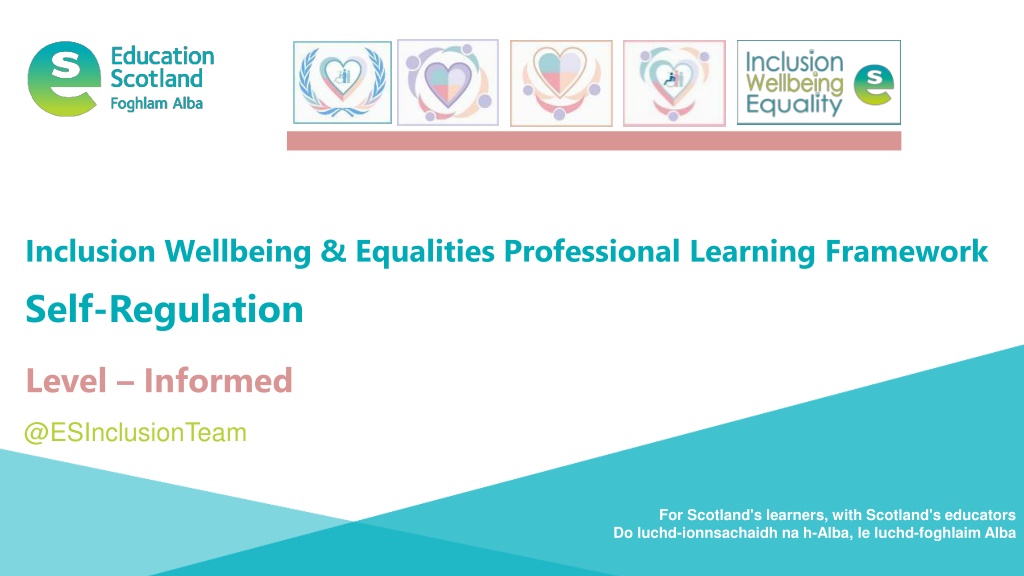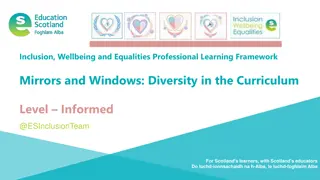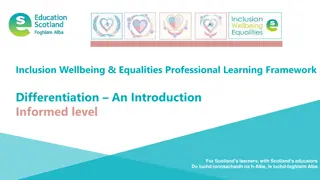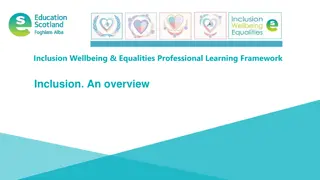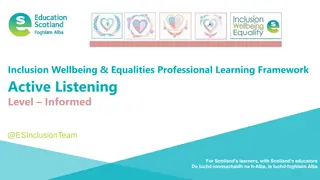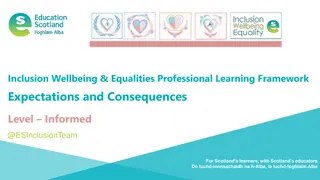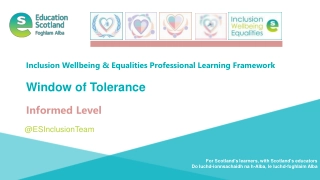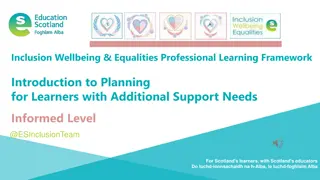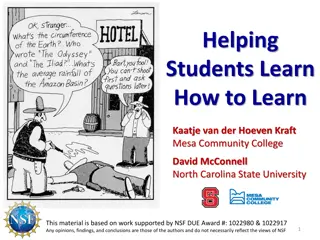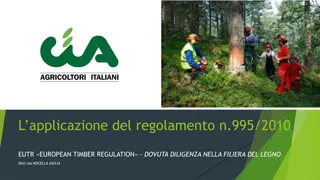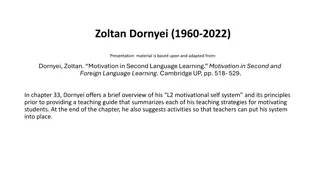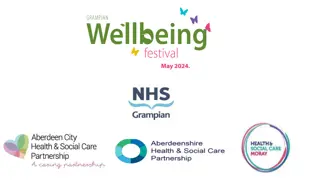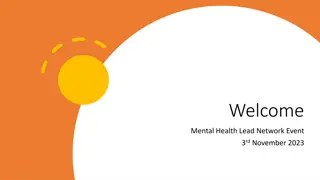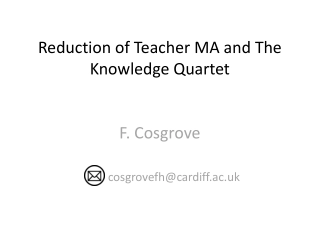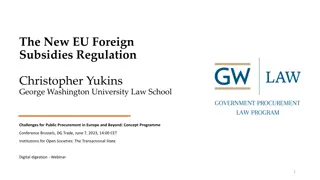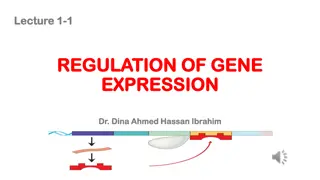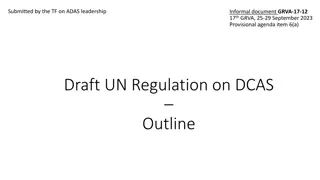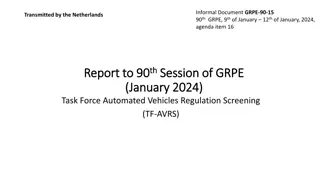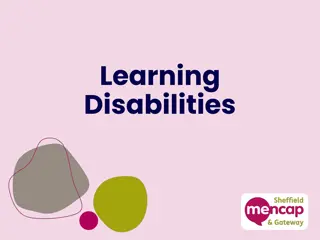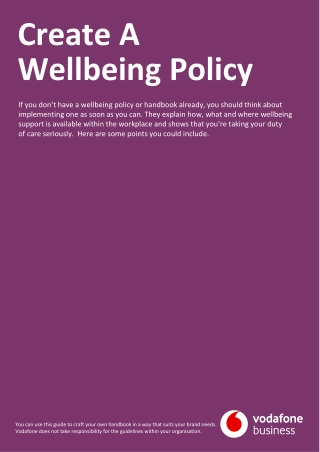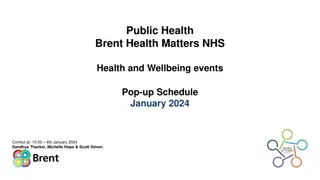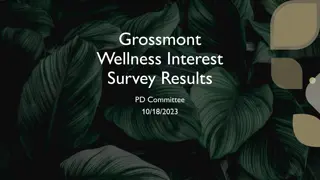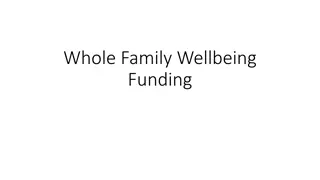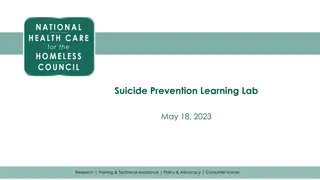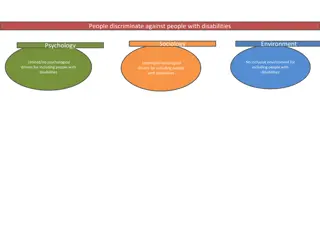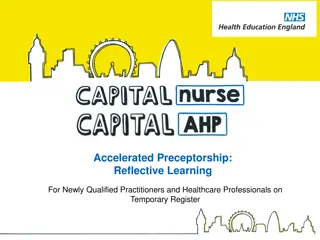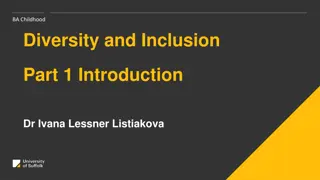Inclusion Wellbeing & Equalities Professional Learning Framework Self-Regulation
Explore a comprehensive professional learning framework focused on inclusion, wellbeing, and equalities for educators in Scotland. Dive into topics such as self-regulation, interconnectivity, and fostering a supportive learning environment. Utilize slides to facilitate group discussions or self-directed learning activities, covering areas like emotional regulation and strategies for supporting learners. Enhance your knowledge and understanding through the National Model for Professional Learning.
Download Presentation
Please find below an Image/Link to download the presentation.
The content on the website is provided AS IS for your information and personal use only. It may not be sold, licensed, or shared on other websites without obtaining consent from the author. Download presentation by click this link. If you encounter any issues during the download, it is possible that the publisher has removed the file from their server.
Presentation Transcript
Inclusion Wellbeing & Equalities Professional Learning Framework Self-Regulation Level Informed @ESInclusionTeam For Scotland's learners, with Scotland's educators Do luchd-ionnsachaidh na h-Alba, le luchd-foghlaim Alba For Scotland's learners, with Scotland's educators Do luchd-ionnsachaidh na h-Alba, le luchd-foghlaim Alba
Interconnectivity For Scotland's learners, with Scotland's educators Do luchd-ionnsachaidh na h-Alba, le luchd-foghlaim Alba
Pause for Thought How to use this resource These slides can be used to facilitate professional learning in a group or whole setting, or as a self-directed learning activity as an individual. Facilitation notes are included at the bottom of each slide Please do not remove or change any of the slides included. Facilitators are welcome to add slides or activities relevant to your own setting, to support discussion and exploration of the topic. Facilitators will know their participants needs best. Anyone who works in an educational setting can be a facilitator and use these slides. For reflection or discussion activities, it is important to establish a safe space which encourages respect and honesty to ensure that everyone is able to participate. For Scotland's learners, with Scotland's educators Do luchd-ionnsachaidh na h-Alba, le luchd-foghlaim Alba
National Model for Professional Learning This professional learning resource will support you to deepen your knowledge and understanding. You will have the opportunity to consider how to take this learning forward on your own and with others. The National Model of Professional Learning (education.gov.scot) For Scotland's learners, with Scotland's educators Do luchd-ionnsachaidh na h-Alba, le luchd-foghlaim Alba
Welcome Pause for Thought This session provides an opportunity to: To define regulation, dysregulation, and self-regulation To consider the importance of self-regulation and the factors that affect self- regulation To consider factors that contribute to regulation and some strategies to support self-regulation To consider how our understanding of nurture is relevant in supporting regulation in our learners For Scotland's learners, with Scotland's educators Do luchd-ionnsachaidh na h-Alba, le luchd-foghlaim Alba
Regulation definitions Emotional Regulation Emotional Dysregulation Inability to maintain a state of inner calmness attention, focus or be alert. Results from experiencing stress beyond one's range of tolerance or ability to cope. (Links to Window Of Tolerance) The ability to maintain a state of calmness, focus and alertness. Being regulated supports the ability to process, think, interact and learn. Self-regulation is the ability to monitor and control our own behaviour, emotions, or thoughts, altering them in accordance with the demands of the situation. (Cook & Cook, 2009) It refers to how efficiently and effectively a child deals with a stressor and then recovers (Porges, 2011; Lillas & Turnbull, 2009; McEwen, 2002). For Scotland's learners, with Scotland's educators Do luchd-ionnsachaidh na h-Alba, le luchd-foghlaim Alba
The importance of self-regulation for learning and life 2:22 min If viewing as a PDF please click this link to watch the film https://youtu.be/m4UGDaCgo_s For Scotland's learners, with Scotland's educators Do luchd-ionnsachaidh na h-Alba, le luchd-foghlaim Alba
Self-regulation vs Self-control Self regulation is: Self control is: recognising, managing, and responding to our emotions and impulses the ability to inhibit strong impulses using personal strategies to return to a calm state an act of will to restrain ourselves Where does this happen in the brain? primarily feeling (limbic) brain primarily thinking (pre frontal cortex) brain Self-regulation makes self-control possible, or, in many cases, unnecessary. Useful Article: Self-Regulation vs. Self-Control, Psychology Today For Scotland's learners, with Scotland's educators Do luchd-ionnsachaidh na h-Alba, le luchd-foghlaim Alba Self regulation is:
Developing Self-Regulation Skills 2.10 min If viewing as a PDF please click this link to watch the film https://youtu.be/gY PYbnzIkXc For Scotland's learners, with Scotland's educators Do luchd-ionnsachaidh na h-Alba, le luchd-foghlaim Alba
Steps to developing self-regulation (Stuart Shanker) During normal development: Expanded steps if stress is trauma-induced: 1. Being helped to feel safe and secure 2. Being aware and able to express emotions 1. Being able to identify and reduce stressors 3. Being able to identify and reduce stressors 2. Being self-aware 4. Being aware of what it feels like to be calm 3. Discovering how to calm agitation 5. Discovering how to calm agitation For Scotland's learners, with Scotland's educators Do luchd-ionnsachaidh na h-Alba, le luchd-foghlaim Alba
Support learners to identify (and reduce) their stressors Be a stress detective consider factors such as: Sensory issues Social environment Physical environment Psychological factors such as safety, sense of belonging, .. Learning factors such as readiness, support needs, Family & community factors Remember stress, often presenting as worry or agitation, can come from more than one source For Scotland's learners, with Scotland's educators Do luchd-ionnsachaidh na h-Alba, le luchd-foghlaim Alba
Supporting the development of self-awareness 4:20 min Name it to Tame it If viewing as a PDF please click this link to watch the film https://youtu.be/ZcDLzppD4Jc For Scotland's learners, with Scotland's educators Do luchd-ionnsachaidh na h-Alba, le luchd-foghlaim Alba
Naming it developing the language of feelings Did that make you feel when Were you feeling when It sounds/looks like that made you feel That would make me feel too I feel when happens too It looks like you are frustrated I can see you are upset Are you feeling sad? It sounds/looks like you were very scared? I wonder if you are feeling a bit embarrassed? I bet that made you angry? From The Ring of Emotions Framework by Alan McLean What Motivates Learning For Scotland's learners, with Scotland's educators Do luchd-ionnsachaidh na h-Alba, le luchd-foghlaim Alba
Further strategies to support self-regulation 3.44 min If viewing as a PDF please click this link to watch the film https://youtu.be /fuymZJcRghk For Scotland's learners, with Scotland's educators Do luchd-ionnsachaidh na h-Alba, le luchd-foghlaim Alba
Developing scripts to support self-regulation Benefits of a (self-talk) script Types of questions to try Is this: A strategy to try when we get stressed (could initially be talked through with the support of an adult) a big deal or a little deal? Encourages us to think about what works and what doesn t work for us scary, not scary? Supports our understanding of how we learn hard to do or easy to do? Asking ourselves the question, helps us to pause, and engage, or re-engage, our thinking brain Helps us understand how we feel about a task or problem For Scotland's learners, with Scotland's educators Do luchd-ionnsachaidh na h-Alba, le luchd-foghlaim Alba
Factors that have an impact on self-regulation The attachment bond between a child and their primary care giver influences brain development and contributes to a person s ability to regulate their emotions which may impact on their capacity to build and maintain relationships. Exposure to adversity and trauma in childhood also plays a role in brain development, coping skills, and resilience. Both of these factors relate to our Window of Tolerance and our capacity to cope with the demands of everyday life. For Scotland's learners, with Scotland's educators Do luchd-ionnsachaidh na h-Alba, le luchd-foghlaim Alba
Self-regulation through the lens of nurture Children's learning is understood developmentally Learners of any age, particularly those who are insecurely attached or who have experienced trauma, may not have developed self-regulation and may need support with this. In responding to dysregulated behaviour we need to ensure that our interactions are developmentally matched to were the learners is and not where we think they should be because of their chronological age. For Scotland's learners, with Scotland's educators Do luchd-ionnsachaidh na h-Alba, le luchd-foghlaim Alba
Self-regulation through the lens of nurture The classroom offers a safe base A safe predictable environment and caring adults will help learners who are insecurely attached or who have experienced trauma to develop both regulation skills and healthier supportive relationships. For Scotland's learners, with Scotland's educators Do luchd-ionnsachaidh na h-Alba, le luchd-foghlaim Alba
Self-regulation through the lens of nurture All behaviour is communication Supporting adults should seek the needs behind negative behaviours or patterns of behaviours and try to address these needs. Without addressing underlying needs the likelihood is that the dysregulated behaviour will recur or even escalate. For Scotland's learners, with Scotland's educators Do luchd-ionnsachaidh na h-Alba, le luchd-foghlaim Alba
Finally, a few things to remember: Learning self-regulation is a natural part of the development process. Every child develops at their own pace so we can expect children of the same age to differ in their ability to self-regulate Some children, for a range of reason, will struggle to self-regulate. We may need to co-regulate with them first and then over time help them develop self-regulation skills (see module on Co-regulation) If we are to respond to distress, in a way that is sympathetic to how the brain works, we first need to help a child or young person regulate before we can reason with them (see module Regulate, Relate, Reason, & Restore) For Scotland's learners, with Scotland's educators Do luchd-ionnsachaidh na h-Alba, le luchd-foghlaim Alba
Resources and Information to help For Scotland's learners, with Scotland's educators Do luchd-ionnsachaidh na h-Alba, le luchd-foghlaim Alba
Reflection From what you have learned so far, think about: How has this made you feel? What has this made you think about? What one action would you like to take forward? How can you link what you plan to do with others in your setting? How you will know that this learning has made a difference? For Scotland's learners, with Scotland's educators Do luchd-ionnsachaidh na h-Alba, le luchd-foghlaim Alba
We value your feedback From now until March 2024 we will be taking feedback on these resources so that we can make changes in advance of a formal launch of the Professional Learning Framework in June 2024 Your feedback could help us improve this resource Please complete this short form, using the link or QR code, to let us know what you thought of it and any suggestions you have on how it could be improved LINK: https://forms.office.com/e/b5PCpJJJ3P For Scotland's learners, with Scotland's educators Do luchd-ionnsachaidh na h-Alba, le luchd-foghlaim Alba
Education Scotland Denholm House Almondvale Business Park Almondvale Way Livingston EH54 6GA T +44 (0)131 244 5000 E enquiries@educationscotland.gsi.gov.uk For Scotland's learners, with Scotland's educators Do luchd-ionnsachaidh na h-Alba, le luchd-foghlaim Alba For Scotland's learners, with Scotland's educators Do luchd-ionnsachaidh na h-Alba, le luchd-foghlaim Alba
